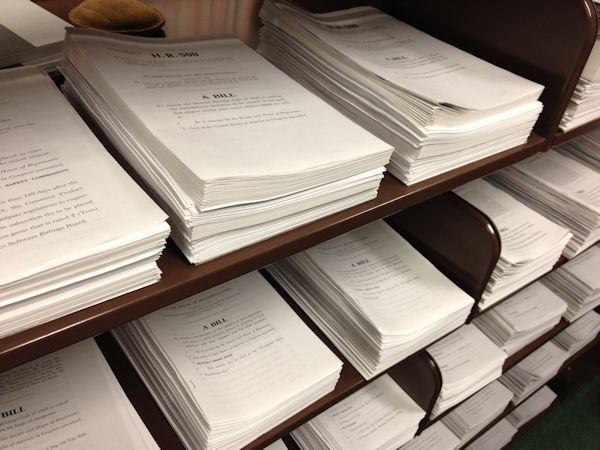SEJournal Online is the digital news magazine of the Society of Environmental Journalists. Learn more about SEJournal Online, including submission, subscription and advertising information.
 |
| Congressional bills stacked up, paper-style. On the digital front, the Library of Congress operates a massive federal bill tracker database, Congress.gov. Photo: Andrew Weber, Library of Congress. Click to enlarge. |
Reporter’s Toolbox: Bill Trackers a Boon for Covering Federal, State Legislation
By Joseph A. Davis
The passage of a bill is very often the hardest of “hard news” for environmental journalists. Yet covering legislation can be tricky. But numerous bill trackers can help you.
So, with the U.S. Congress and state legislatures entering their election-year frenzy of finalizing legislation, it’s a good time to take a look at bill-tracking tools.
[First, it helps to have some clue about how the legislative process works. There are many primers on “how a bill becomes a law,” a subject beyond the scope of this Toolbox. Find some on the congressional process at websites like Vote Smart, USA.gov, GovTrack, Hispanic Association of Colleges and Universities, Sen. Tom Carper of Delaware and even at the kids’ magazine Junior Scholastic.]
Congress serves up extensive legislative database
The first and most powerful tool is the federal bill tracker run by Congress itself (or really by the Library of Congress), known as Congress.gov. It is a massive database of both current and past legislation, free, online and searchable.
The first thing you need is a bill number. This is a key identifier, but it may rarely actually go into the story you are writing itself because your audience doesn’t usually recognize bill numbers.
Second best is a bill title. This may be problematic too, because bill titles, assigned by sponsors, often euphemize (aka lie about) the bill’s actual content. Still, it can help in looking things up.
You can often find bill numbers by putting the right search term into the search engine at Congress.gov. For example, if you search on the simple term “PFAS,” you will get some 65 bills. Then you have to go through them and pick out the one you want. But at least you will have a bill number, which is what you need to look up all the other information you want.
The people in Congress are only human, and
as the massive late-session rush and crush sets in,
the Congress.gov tracker may start running late.
So always ground-truth your initial results.
But beware. Bills may have several numbers. For example, the version introduced in the House will be numbered differently from that in the Senate. As bills evolve, they often get new numbers. Congress.gov tries to help with this (sometimes successfully), with a “Related Bills” tab on your results page.
Another caveat: The people in Congress are only human, and as the massive late-session rush and crush sets in, the Congress.gov tracker may start running late. It may take a day or two to show the information you want. So always ground-truth your initial results.
Digging in to bill details
Once you have a bill number, you can put that into the search engine, and you will get an array of links to everything in the database about the bill. That includes bill text(s), committee reports, bill summaries, cosponsors, all legislative action, links to all filed amendments and more.
Yes, you can get the actual legislative text on the tracker. But bill language can often be befuddling, if only because it may be amending existing law, by reference and without explanation.
Sometimes, the committee report accompanying the bill gives an accurate plain-English explanation of what the bill does and the reasons for it. The text will change as the bill goes through the process, and the latest one is usually what you need.
Keep in mind that any member can introduce any bill, no matter how trivial. Thousands of bills are introduced — but many of these are to name a post office or declare a message. Only a small fraction ever even get a committee hearing and an even smaller percent (perhaps 5%) ever see a vote. Even fewer go the distance to become law.
Don’t ignore the Congressional Record, which is accessible via Congress.gov. This contains every word uttered on the floor of both chambers. Moreover, it is cross-indexed — so when you look up a bill there are links to all discussion of it in the Record.
You can create a free personal account on Congress.gov, which allows you to save searches and to get email notices when something happens on a bill you follow.
Other bill trackers, plus tracking state legislation
Other bill trackers not run by Congress may be commercial products funded by subscription or advertising.
An example is GovTrack.us. Some, like GovPredict or Quorum, integrate other information that may be useful to lobbyists. Others, like that maintained by the American Academy of Family Physicians, are focused on a single issue area. Also, some, like TrackBill, are designed to be used on smartphones.
Important legislation on environmental topics happens at the state level, too. And unless you only cover a single state, this gets complicated.
Virtually every state legislature in the United States has a website that incorporates some kind of bill tracker. Some are more useful than others, and each state legislature has its own rules, procedures and conventions that you will need to learn about.
Congress.gov has thoughtfully collected them in a graphic directory here.
Another portal to this world is the National Conference of State Legislatures, or NCSL, which is a handy source for many state legislative matters. NCSL compiles handy status lists on many issues trending in state legislatures.
Other commercial legislative databases, like BillTrack50, try to simplify the task of following 50 states at once.
LexisNexis also keeps a state legislative database, which you may have access to if your publication already pays for the main service.
Joseph A. Davis is a freelance writer/editor in Washington, D.C. who has been writing about the environment since 1976. He writes SEJournal Online's TipSheet and Reporter's Toolbox columns. Davis also directs SEJ's WatchDog Project and writes WatchDog Alert and a recently relaunched WatchDog opinion column. In addition, he compiles SEJ's daily news headlines, EJToday.
* From the weekly news magazine SEJournal Online, Vol. 5, No. 11. Content from each new issue of SEJournal Online is available to the public via the SEJournal Online main page. Subscribe to the e-newsletter here. And see past issues of the SEJournal archived here.














 Advertisement
Advertisement 



